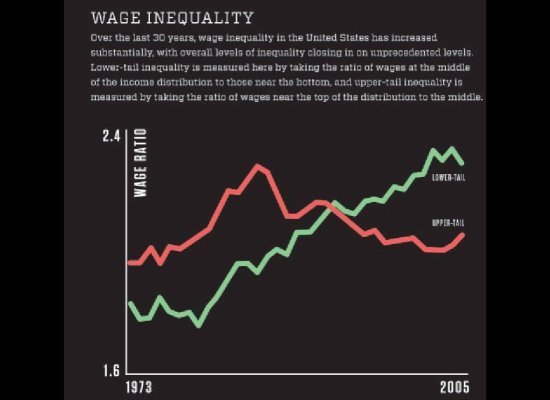The Rich Get Richer: Income Inequality and Political Power

The facts and figures surrounding income inequality are so outrageous that it’s hard to understand why people aren’t more outraged about it. The fact is, the situation is more insidious in our lives than is obvious, because income inequality is undermining democracy and will continue to do so until the nation rises up against it or slouches its way into true plutocracy.
It is a real problem. Today in America, one percent of the population earns 25 percent of all income and controls 40 percent of the nation’s wealth, according to economist Joseph Stiglitz.
“Twenty-five years ago, the corresponding figures were 12 percent and 33 percent,” Stiglitz wrote in the May 2011 issue of Vanity Fair.
The situation shows no sign of getting better. One example of the disparity is in the earnings of CEOs compared with those of workers in their companies. In 1970, heads of companies made 39 times the salary of the average workers. By the year 2000, that number had ballooned to 1039 times average salaries. The current recession has made the gap even larger.
Stiglitz says that people remain unconcerned about these numbers because what matters to most people “is not how the pie is divided but the size of the pie. That argument is fundamentally wrong,” Stiglitz warns. “An economy in which most citizens are doing worse year after year—an economy like America’s—is not likely to do well over the long haul.”
Stiglitz writes, "Economists are not sure how to fully explain the growing inequality in America, but one big part of the reason we have so much inequality is that the top 1 percent want it that way."
Mark Thoma explains why that is so in an article in The Fiscal Times. He notes that inter-generational mobility (that is, the ability to climb the ladder by children of lower socioeconomic groups) has decreased dramatically because opportunities for education, health care and other factors that would enable such mobility have lessened. The wealthy generally oppose plans to increase these opportunities for the masses, hence protecting their place at the top of the food chain.
Mobility, Thoma writes, “can be hampered by the concentration of wealth and power. If wealth and power can be passed from generation to generation, and if the power that comes with wealth allows individuals to erect barriers that protect their businesses from competition or regulation, then the wealth that is passed from generation to generation serves as a barrier to mobility both within and across generations.”
Worst of all, concentrated wealth means concentrated political power. In the age of SuperPacs and Citizens United, it is money that speaks the loudest in terms of electing politicians and influencing policy.
Stiglitz argues that “a modern economy requires ‘collective action’—it needs government to invest in infrastructure, education, and technology.” Such investments are often opposed by the wealthy, who can take care of their own needs without government assistance.
MIT ecomomist Daron Acemoglu puts it this way:
“…when economic inequality increases, the people who have become economically more powerful will often attempt to use that power in order to gain even more political power. And once they are able to monopolize political power, they will start using that for changing the rules in their favor. And that sort of political inequality is the real danger that’s facing the United States.”
The Occupy Wall Street movement clearly articulated the income inequality issue, introducing the 1 percent/99 percent dichotomy in dramatic fashion. Whether the OWS perspective fires the public imagination and brings about a reversal of the growing problem has yet to be seen. But one thing seems certain: inaction will ensure ever-expanding income inequality and further erosion of the middle class.




